Dementia Researcher Blogs
The Dementia Researcher Blogs Podcasts - through this show, you can hear our bloggers read their blogs. So if you prefer to read, you can head or our website or you can listen on the move. These shows are about academic / research careers, research, science and life as an early career dementia researchers. Brought to you by https://www.dementiaresearcher.nihr.ac.uk - everything you need, all in one place. Remember to subscribe to our main ‘Dementia Researcher‘ Podcast, here and where ever you get your podcasts.
The Dementia Researcher Blogs Podcasts - through this show, you can hear our bloggers read their blogs. So if you prefer to read, you can head or our website or you can listen on the move. These shows are about academic / research careers, research, science and life as an early career dementia researchers. Brought to you by https://www.dementiaresearcher.nihr.ac.uk - everything you need, all in one place. Remember to subscribe to our main ‘Dementia Researcher‘ Podcast, here and where ever you get your podcasts.
Episodes
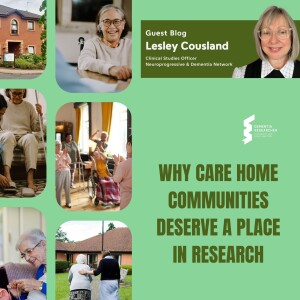
Monday Jul 07, 2025
Lesley Cousland - Why Care Home Communities Deserve a Place in Research
Monday Jul 07, 2025
Monday Jul 07, 2025
Lesley Cousland, narrating her blog written for the Dementia Researcher website.
In this blog, Lesley makes a case for why care home communities must be fully included in research. Drawing on experience and examples from her work, she highlights the exclusion faced by residents and staff, not due to inability but because systems and assumptions make participation unnecessarily difficult. The blog outlines practical steps for inclusion and urges researchers, policymakers, and care providers to actively listen and involve those who live and work in care homes.
Find the original text, and narration here on our website.
https://www.dementiaresearcher.nihr.ac.uk/blog-why-care-home-communities-deserve-a-place-in-research/
#DementiaResearch #ClinicalTrials #Research #CareHome #ENRICHScotland
--
Lesley Cousland is a Clinical Studies Officer with the Neuroprogressive and Dementia Network and ENRICH Scotland. A retired mental health nurse with over 40 years’ experience, she now supports research in care homes, ensuring residents and staff help shape studies that matter to them.
--
Enjoy listening? We're always looking for new bloggers, drop us a line. http://www.dementiaresearcher.nihr.ac.uk
This podcast is brought to you in association with Alzheimer's Association, Alzheimer's Research UK, Alzheimer's Society and Race Against Dementia, who we thank for their ongoing support.
--
Follow us on Social Media:
https://www.instagram.com/dementia_researcher/
https://www.facebook.com/Dementia.Researcher/
https://twitter.com/demrescommunity
https://www.linkedin.com/company/dementia-researcher
https://bsky.app/profile/dementiaresearcher.bsky.social
Join our community:
https://onelink.to/dementiaresearcher

Friday Jul 04, 2025
Dr Yvonne Couch - Coaching and Self-Reflection
Friday Jul 04, 2025
Friday Jul 04, 2025
Dr Yvonne Couch, narrates her blog written for the Dementia Researcher website.
In this blog, Yvonne shares her experience of working with a coach to explore identity, confidence, and purpose in academia. Through a humorous and vulnerable lens, she outlines how coaching has helped her challenge ingrained behaviours, understand her motivations, and untangle self-worth from professional achievement. The post highlights why self-reflection matters and how coaching can offer a constructive, external perspective for academics at all stages.
Find the original text, and narration here on our website.
https://www.dementiaresearcher.nihr.ac.uk/blog-coaching-and-self-reflection/
--
Dr Yvonne Couch is a Research Fellow and Associate Professor at the University of Oxford. Yvonne studies the role of extracellular vesicles and their role in changing the function of the vasculature after stroke, aiming to discover why the prevalence of dementia after stroke is three times higher than the average. It is her passion for problem solving and love of science that drives her, in advancing our knowledge of disease. Yvonne writes about her work, academic life, and careers as she takes a new road into independent research.
--
Enjoy listening? We're always looking for new bloggers, drop us a line. http://www.dementiaresearcher.nihr.ac.uk
This podcast is brought to you in association with Alzheimer's Association, Alzheimer's Research UK, Alzheimer's Society and Race Against Dementia, who we thank for their ongoing support.
--
Follow us on Social Media:
https://www.instagram.com/dementia_researcher/
https://www.facebook.com/Dementia.Researcher/
https://twitter.com/demrescommunity
https://www.linkedin.com/company/dementia-researcher
https://bsky.app/profile/dementiaresearcher.bsky.social

Wednesday Jul 02, 2025
Dr Jodi Watt - Who Gets Left Out of Dementia Prevention?
Wednesday Jul 02, 2025
Wednesday Jul 02, 2025
Dr Jodi Watt, narrating a new blog they wrote for the Dementia Researcher website.
In this blog, Jodi Watt challenges the dominant narrative around dementia prevention. While lifestyle factors like diet and exercise are often emphasised, she argues these overlook deep-rooted structural inequalities. Jodi explores how factors such as poverty, racism, disability, housing, and access to healthcare shape exposure to risk and capacity to prevent dementia. She calls for a shift away from individual responsibility and towards systemic change, advocating for prevention strategies grounded in equity, lived experience, and justice.
Find the original text, and narration here on our website.
https://www.dementiaresearcher.nihr.ac.uk/blog-who-gets-left-out-of-dementia-prevention/
--
Dr Jodi Watt is a Postdoctoral Researcher at University of Glasgow. Jodi's academic interests are in both healthy ageing and neurodegenerative diseases of older age, and they are currently working on drug repurposing for dementia. Previously they worked on understanding structural, metabolic and physiological brain changes with age, as measured using magnetic resonance imaging. As a queer and neurodiverse person, Jodi is also incredibly interested in improving diversity and inclusion practices both within and outside of the academic context.
--
Enjoy listening? We're always looking for new bloggers, drop us a line. http://www.dementiaresearcher.nihr.ac.uk
This podcast is brought to you in association with Alzheimer's Association, Alzheimer's Research UK, Alzheimer's Society and Race Against Dementia, who we thank for their ongoing support.
--
Follow us on Social Media:
https://www.instagram.com/dementia_researcher/
https://www.facebook.com/Dementia.Researcher/
https://twitter.com/demrescommunity
https://www.linkedin.com/company/dementia-researcher
https://bsky.app/profile/dementiaresearcher.bsky.social

Thursday Jun 26, 2025
Emily Spencer - The Exhausting Reality of Data Collection
Thursday Jun 26, 2025
Thursday Jun 26, 2025
Emily Spencer, narrating her blog written for the Dementia Researcher website.
In this blog Emily, writes about the exhausting reality of data collection in her dementia research. Working in GP surgeries to video record consultations, she reflects on the challenge of building trust, managing logistics, and staying composed while juggling the demands of parenting and long commutes. Though rewarding, the process is draining, and Emily explores how she is learning to rest and make space for recovery.
Find the original text, and narration here on our website.
https://www.dementiaresearcher.nihr.ac.uk/blog-the-exhausting-reality-of-data-collection/
#DementiaResearch #AcademicMother #Academia #MaternityLeave #Research #Productivity #PhDWriting #PhDLife
--
Emily Spencer is a PhD Student at University College London looking at improving how GPs communicate with people with dementia and their family carers about their future care. Emily previous had a 5 year career break to pursue a career as a musician, and has previously undertaken research on improving the care people with dementia receive from their GP practice, as well as end-of-life and palliative care provision in the community. Emily is also a new mum and will be writing about her experiences navigating motherhood and a research career.
--
Enjoy listening? We're always looking for new bloggers, drop us a line. http://www.dementiaresearcher.nihr.ac.uk
This podcast is brought to you in association with Alzheimer's Association, Alzheimer's Research UK, Alzheimer's Society and Race Against Dementia, who we thank for their ongoing support.
--
Follow us on Social Media:
https://www.instagram.com/dementia_researcher/
https://www.facebook.com/Dementia.Researcher/
https://x.com/demrescommunity
https://bsky.app/profile/dementiaresearcher.bsky.social
https://www.linkedin.com/company/dementia-researcher
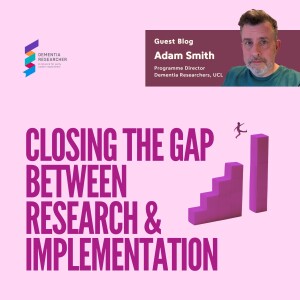
Monday Jun 23, 2025
Adam Smith - Closing the Gap Between Research and Implementation
Monday Jun 23, 2025
Monday Jun 23, 2025
Adam Smith narrates his blog written for Dementia Researcher.
In this guest blog, Adam explores the persistent challenge of getting research findings into practice, especially in dementia care. Drawing on conversations from the Dementia Researcher podcast and community, he highlights the common frustrations researchers face when promising ideas stall after funding ends. Adam shares five practical strategies to bridge the gap between research and implementation, calling for funders and institutions to support the next step in making research useful and sustainable in real settings.
Find the original text, and narration here on our website.
https://www.dementiaresearcher.nihr.ac.uk/blog-closing-the-gap-between-research-and-implementation/
--
Adam Smith was born in the north, a long time ago. He wanted to write books, but ended up working in the NHS, and at the Department of Health. He is now Programme Director in the Office of the NIHR National Director for Dementia Research (which probably sounds more important than it is) at University College London. He has led a number of initiatives to improve dementia research (including this website, Join Dementia Research & ENRICH), as well as pursuing his own research interests. In his spare time, he grows vegetables, builds Lego & spends most of his time drinking too much coffee and squeezing technology into his house.
--
Enjoy listening? We're always looking for new bloggers, drop us a line. http://www.dementiaresearcher.nihr.ac.uk
This podcast is brought to you in association with Alzheimer's Association, Alzheimer's Research UK, Alzheimer's Society and Race Against Dementia, who we thank for their ongoing support.
--
Follow us on Social Media:
https://www.instagram.com/dementia_researcher/
https://www.facebook.com/Dementia.Researcher/
https://twitter.com/demrescommunity
https://www.linkedin.com/company/dementia-researcher
https://bsky.app/profile/dementiaresearcher.bsky.social
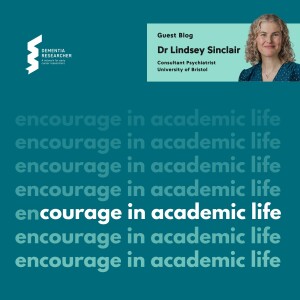
Friday Jun 20, 2025
Dr Lindsey Sinclair - Courage in Academic Life
Friday Jun 20, 2025
Friday Jun 20, 2025
Dr Lindsey Sinclair narrates her blog written for Dementia Researcher.
In this blog, Lindsey explores the role of courage in academic life. From the challenge of stepping into the spotlight to asking for help, she shares examples of bravery at all levels of research careers. Drawing from her own journey, personal, professional, and occasionally painful, she reminds us that many small acts of courage can build a meaningful and successful career in science. Whether it’s speaking up, reaching out, or simply trying again, courage underpins progress.
Find the original text, and narration here on our website.
https://www.dementiaresearcher.nihr.ac.uk/blog-courage-in-academic-life/
--
Dr Lindsey Sinclair is an Honorary Senior Clinical Research Fellow at the University of Bristol and a Locum Consultant in Old Age Psychiatry. Her research explores the relationship between depression and dementia, combining lab work with epidemiology and genetics. Clinically, she works with older adults experiencing a wide range of mental health problems. Outside of work, she’s a keen baker and runner, and has a particular talent for creating ambitious birthday cakes.
Find Lindsey on LinkedIn
--
Enjoy listening? We're always looking for new bloggers, drop us a line. http://www.dementiaresearcher.nihr.ac.uk
This podcast is brought to you in association with Alzheimer's Association, Alzheimer's Research UK, Alzheimer's Society and Race Against Dementia, who we thank for their ongoing support.
--
Follow us on Social Media:
https://www.instagram.com/dementia_researcher/
https://www.facebook.com/Dementia.Researcher/
https://x.com/demrescommunity
https://bsky.app/profile/dementiaresearcher.bsky.social
https://www.linkedin.com/company/dementia-researcher
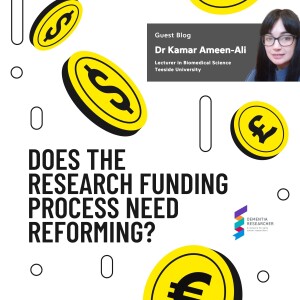
Tuesday Jun 17, 2025
Dr Kamar Ameen-Ali - Does the research funding process need reforming?
Tuesday Jun 17, 2025
Tuesday Jun 17, 2025
Dr Kamar Ameen-Ali narrates her blog written for Dementia Researcher.
In this blog, Kam critically explores how research funding is currently awarded and argues that the process, while central to academic success, is fraught with subjectivity and bias. Drawing on her own experiences and wider evidence, she considers reforms such as blind reviewing, partial randomisation, and incentives for good research practice, all with the aim of making the system fairer and more conducive to innovation, especially for early career and minoritised researchers.
Find the original text, and narration here on our website.
https://www.dementiaresearcher.nihr.ac.uk/blog-does-the-research-funding-process-need-reforming/
--
Dr Kamar Ameen-Ali is a Lecturer in Biomedical Science at Teesside University & Affiliate Researcher at Glasgow University. In addition to teaching, Kamar is exploring how neuroinflammation following traumatic brain injury contributes to the progression of neurodegenerative diseases that lead to dementia. Having first pursued a career as an NHS Psychologist, Kamar went back to University in Durham to look at rodent behavioural tasks to completed her PhD, and then worked as a regional Programme Manager for NC3Rs.
--
Enjoy listening? We're always looking for new bloggers, drop us a line. http://www.dementiaresearcher.nihr.ac.uk
This podcast is brought to you in association with Alzheimer's Association, Alzheimer's Research UK, Alzheimer's Society and Race Against Dementia, who we thank for their ongoing support.
--
Follow us on Social Media:
https://www.instagram.com/dementia_researcher/
https://www.facebook.com/Dementia.Researcher/
https://x.com/demrescommunity
https://bsky.app/profile/dementiaresearcher.bsky.social
https://www.linkedin.com/company/dementia-researcher
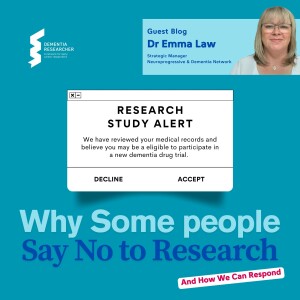
Monday Jun 16, 2025
Dr Emma Law - Why Some people Say No to Research And How We Can Respond
Monday Jun 16, 2025
Monday Jun 16, 2025
Dr Emma Law, narrating her blog written for the Dementia Researcher website.
In this blog, Emma explores why some people choose not to take part in dementia research. She looks at what might influence their decision, including misunderstandings, personal concerns, family pressure, and practical barriers. Emma offers respectful ways to respond, aiming to support informed choice while recognising that research is never the right option for everyone.
Find the original text, and narration here on our website.
https://www.dementiaresearcher.nihr.ac.uk/blog-why-some-people-say-no-to-research-and-how-we-can-respond/
#DementiaResearch #ClinicalTrials #Research #TrialDelivery
--
Dr Emma Law is Strategic Manager for the The Neuroprogressive and Dementia Network in Scotland. Emma has 13 years experience as a Clinical Trails Network Manager and over 35 years experience as a Nurse, many of which were spent in the delivery of Clinical Research Trials. Emma completed her PhD and is passionate about giving people living with dementia and their carers access to participate in research.
--
Enjoy listening? We're always looking for new bloggers, drop us a line. http://www.dementiaresearcher.nihr.ac.uk
This podcast is brought to you in association with Alzheimer's Association, Alzheimer's Research UK, Alzheimer's Society and Race Against Dementia, who we thank for their ongoing support.
--
Follow us on Social Media:
https://www.instagram.com/dementia_researcher/
https://www.facebook.com/Dementia.Researcher/
https://twitter.com/demrescommunity
https://www.linkedin.com/company/dementia-researcher
https://bsky.app/profile/dementiaresearcher.bsky.social
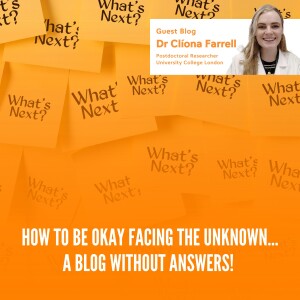
Friday Jun 13, 2025
Dr Clíona Farrell - How to be okay facing the unknown
Friday Jun 13, 2025
Friday Jun 13, 2025
Dr Clíona Farrell, narrating her blog written for the Dementia Researcher website.
In this blog, Clíona explores the challenge of facing an uncertain future as her first postdoc contract nears its end. Choosing to take a career break for travel without a fixed plan in place, she reflects on her discomfort with uncertainty, the pressure of well-meaning questions from others, and the wider instability faced by early career researchers. While offering no tidy solutions, Clíona shares what’s helping her cope, and invites others to join the conversation about managing change and the unknown.
Find the original text, and narration here on our website.
https://www.dementiaresearcher.nihr.ac.uk/blog-how-to-be-okay-facing-the-unknown/
--
Dr Clíona Farrell is a Postdoctoral Researcher in the UK Dementia Research Institute at University College London. Her work focuses on understanding neuroinflammation in Down syndrome, both prior to, and in response to, Alzheimer’s disease pathology. Originally from Dublin, Ireland, Clíona completed her undergraduate degree in Neuroscience in Trinity College, and then worked as a research assistant in the Royal College of Surgeons studying ALS and Parkinson’s disease. She also knows the secret behind scopping the perfect 99 ice-cream cone. @ClionaFarrell_--
Enjoy listening? We're always looking for new bloggers, drop us a line. http://www.dementiaresearcher.nihr.ac.uk
This podcast is brought to you in association with Alzheimer's Association, Alzheimer's Research UK, Alzheimer's Society and Race Against Dementia, who we thank for their ongoing support.
--
Follow us on Social Media:
https://www.instagram.com/dementia_researcher/
https://www.facebook.com/Dementia.Researcher/
https://twitter.com/demrescommunity
https://www.linkedin.com/company/dementia-researcher
https://bsky.app/profile/dementiaresearcher.bsky.social





